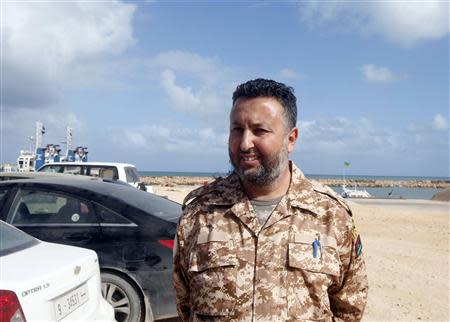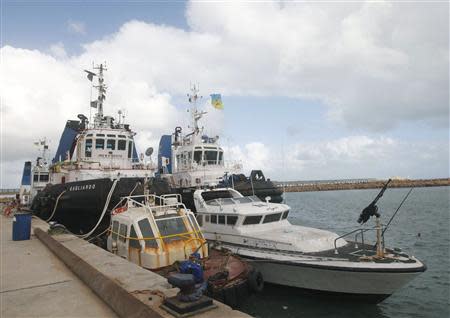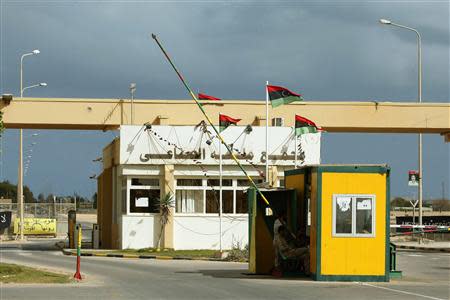In Libya's west, Berber anger spills into gasfields
By Ulf Laessing MELLITAH PORT, Libya (Reuters) - After seizing a Libyan port and halting oil exports, former army officer Adel al-Falu has set his sights on a more drastic protest to win rights for his ethnic Amazigh people - shutting off the gas tap which supplies Italy. Long oppressed by former Libyan leader Muammar Gaddafi, the Amazigh minority, or Berbers, were quick to join the NATO-backed uprising in 2011 which overthrew him. Now they have again donned their militia uniforms and taken up arms for what some are calling a second revolution. With 50 other Amazigh, Falu two weeks ago seized control of Libya's Mellitah port, which is operated by the state National Oil Corp and Italy's ENI. They have also threatened to close down gas supplies across the Mediterranean. The Berber protest has added to the already difficult task facing Libyan Prime Minister Ali Zeidan as he attempts to contain dozens of rival militias and former fighters who have seized control over parts of the country including its eastern oil ports. "We can stop gas exports to Europe ...to pressure Italy and the European Union to push (Libya's) General National Congress (assembly) to recognize the Amazigh language," said Falu, an army officer who once guarded Mellitah. "We are Muslims and Libyans but the Arabs discriminate against us." The Amazigh demands are broad. They want more rights and want the central government and parliament - paralyzed by infighting - to guarantee their language and culture in Libya's planned constitution. Their protest at Mellitah parallel the seizure of ports to the east by another armed group demanding more regional autonomy, a move that has slashed the OPEC country's oil production. Oil sources say crude exports from Mellitah were halted earlier this month though ENI has disputed the assertion that all flows had been suspended. Amazigh earlier this year briefly shut down the gas pipeline supplying Mellitah. At Mellitah, Berber protesters drive unchallenged through the front gate of the large oil and gas complex located some 100 km (63 miles) west of the capital Tripoli. The guards salute them. Two weeks ago, the militiamen arrived in coastguard boats they seized during the 2011 revolt. After briefly boarding two tankers loading oil, they hoisted banners and flags and put up tents at the terminal - one on a rock outcrop in the harbor. Four Italian tugboats that usually assist tankers to dock are now moored alongside one of the protesters' boats armed with a small cannon fastened to its bow. The Amazigh protesters, a mix of youth, middle-aged or older civil servants and soldiers from the nearby town of Zuwara and other Amazigh communities, are settled in for a long protest. "I came to join my fellow people," said Salim Wara, a 49-year old bank employee from Nalut in the Western mountains some 100 km from the Mediterranean coast. "We had expected a better life after Gaddafi but we still face discrimination." Amazigh have organized themselves into military-like units, sleeping in quarters based on their former rebel units and working in shifts. Off-duty protesters smoke water pipes and drink tea in a cluster of staff portacabins and tents. "I am ready to die for my rights," said 60-year old Jamal Mansouri, sitting next to Amazigh flags flying over the port he stormed almost two weeks ago. "We want to practice our language and culture without any discrimination." DEMANDS FROM 'FREE ONES' Berbers, who call themselves Amazigh or "Free Ones", inhabited North Africa for thousands of years before Arabs brought Islam to the region in the seventh century. They live not just in Libya but also in Morocco, Tunisia, Morocco and Mauritania. Tensions with Arabs have led to violence in the past. Some of their demands are similar to people in other parts of Libya who have seized oil ports and fields. These include better security and more development from the country's enormous oil wealth. Still, it is hard for Zeidan to deliver on such demands as he struggles to assert control and rein in militias and Islamists opposing him. The prime minister himself was briefly kidnapped last month by one militia group employed by his government. Amazigh leaders have boycotted a committee which is to draft a new constitution unless their people get a greater say and decisions on minority languages. Minorities have only six seats in the 60-member assembly. Some Arabs tend to look down on the Amazigh as an African tribe or fear that granting them special minority rights will fuel separatist aspirations. Gaddafi banned the teaching of their language and culture. And some more moderate Amazigh leaders acknowledge life has improved some since the fall of Gaddafi who jailed Amazigh and banned their language. People mainly spoke it at home but now Berber political banners and shop advertisements are everywhere in the town of Zuwara. In 2011, the local council of Zuwara and other Berber communities started teaching their language in primary schools, hiring their own teachers from Morocco and Algeria. But despite a promise of some state help next year, the Amazigh want more. "Our main demand is that the language of the Amazigh and our culture will be guaranteed in the constitution," Ghali Twini, a member of the local council said. Many Amazigh oppose the government, favoring a federal system that devolves regional powers. Residents in Zuwara sympathize with the port protesters but their mood is less belligerent. "We've tried so many things before, demonstrating, talking to the government," said Yousra al-Hasairi, a veiled medical laboratory student. "They didn't listen so we had to take this last resort." (Editing by Patrick Markey and Jason Neely)



